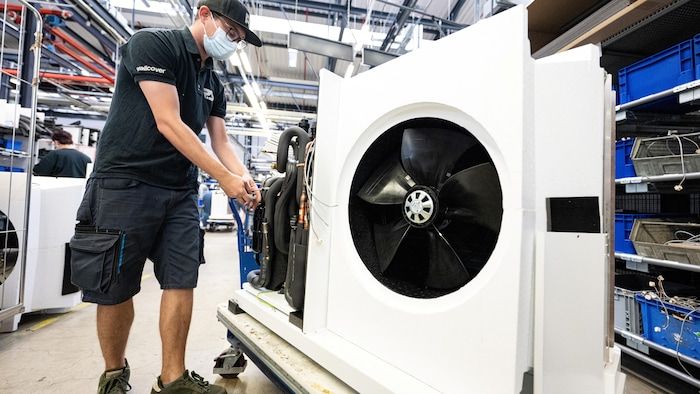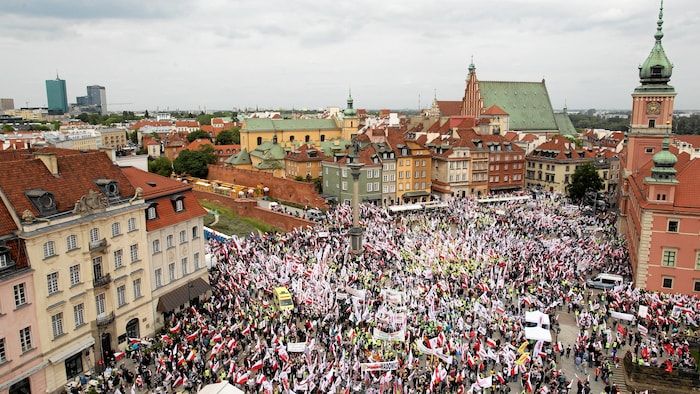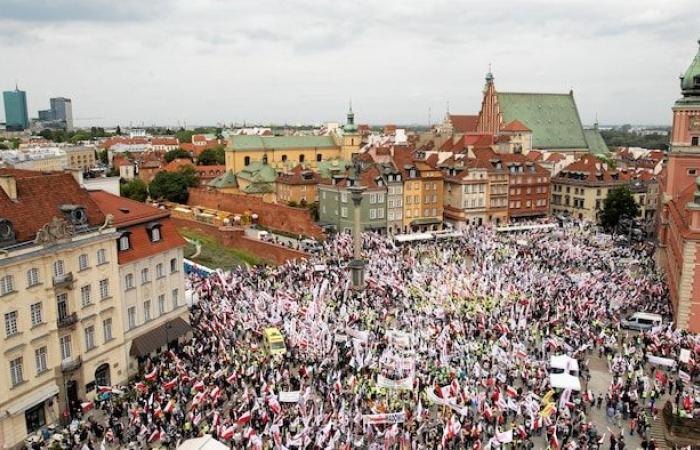We can say that a lot of water has flowed under the bridge since the last European elections in 2019.
The climate issue was then at the center of national conversations. The electoral results were also exceptional for the Greens, who took advantage of the favorable context of the time, fueled by the major citizen marches for the climate in major cities around the world.
The European Union (EU), which represents 450 million citizens, has become the real driving force for climate action on the planet.
As of December 2019, the famous European Green Deal took shape, one of the most ambitious environmental roadmaps in the world. The plan aims to transform many sectors of society, with a main ambition: to reduce EU emissions by 55% by 2030 compared to 1990 levels and by 90% by 2040, and achieve neutrality carbon at the turn of 2050.
The Green Deal is quickly becoming one of the flagship policies of the European Commission. It proposes a myriad of ambitious environmental measures, such as banning the sale of gasoline vehicles in 2035, reducing gas boilers in buildings, the ecological shift in agriculture or eliminating land artificialization. .
Measures which galvanized opposition from the nationalist and Eurosceptic right and which provoked a change in tactics from the far right in the face of climate issues.
Open in full screen mode
President of the French far-right National Rally (RN) party and MP Marine Le Pen poses with a document during a press conference to present a counter-proposal for a referendum on ecology in Paris, March 9, 2021.
Photo: afp via getty images / ALAIN JOCARD
For a long time, far-right European parties were content to profess the rhetoric of climate denial to mark their opposition to climate policies, in particular by sowing doubt about the scientific facts supporting climate change.
For example, in 2012, during her first presidential campaign as leader of the National Front (now National Rally), Marine Le Pen was questioned by the media TerraEco: According to you, climate change does not exist?
To which she responds: That’s not what I’m saying. I am not sure that human activity is the main origin of this phenomenon.
An allegation already largely refuted at the time by IPCC experts and whose knowledge since has only confirmed that human responsibility is decisive in the phenomenon.
In 2015, while the famous COP21 was being held in the French capital, which would bring about the Paris Agreement, the French far right organized a counter-summit to oppose the process. The event will not take place, due to the attacks which struck Paris on November 13, 2015.
But times have changed, and the environmental doctrine of the far right has become more refined.
Most [des dirigeants de partis d’extrême droite] have abandoned this discourse, as concern over climate change grows, although some remain climate skeptics
said a few days ago to France Information sociologist Lluis de Nadal Alsina, a specialist in the relationship between populism and social movements from the University of Glasgow.
Indeed, with droughts, heatwaves, water shortages, floods and forest fires increasing on the European continent, it has become difficult for far-right parties to deny the reality of the facts. Everyone is more affected, even their potential voters.
Added to this was the general increase in the cost of living, and in particular the cost of energy, an effect of Russia’s invasion of Ukraine.
Far-right groups have been able to take advantage of these inflationary tensions by making the climate issue a divisive subject.
Open in full screen mode
A Czech firefighter tries to put out a forest fire burning near the village of Provatonas in the Evros region, Greece, September 3, 2023.
Photo: Reuters / ALEXANDROS AVRAMIDIS
Ecology criticized as a Trojan horse
Rather than denouncing the scientific consensus, most far-right groups are changing their target: they are now attacking lifestyle changes imposed by environmental policies decreed by national governments or by Brussels.
In the Netherlands, it is nitrogen crisis
which has sent the agricultural world into turmoil and which has galvanized the far right over the last two or three years. Following a directive from the Green Deal, the Dutch government imposed a 50% reduction in emissions of nitrous oxide – a powerful GHG – from fertilizers or livestock in 2022.
A measure which aroused the anger of the rural world and which exploded the vote in favor of populist parties in the local elections of 2023, including the Citizen Farmer Movement (the BBB) and the far-right formation of Geert Wilders, the Parti for freedom. The government doesn’t want us anymore
said to France Information a breeder of cows and pigs.
The Zero Net Artificialization (ZAN) policy is another good example of this phenomenon. This measure of the European Green Deal aims to reduce the destruction of natural environments. In France as in the Netherlands, the far right fought this policy: What is attacked by the ZAN is the model of suburban France which wants to be peaceful, the France of the individual car, it is the roots
said French RN deputy Pierre Meurin to the newspaper The world. : global-free-trade nomadism”,”text”:”Macronists and ecologists want a liquid society, where everyone lives only by constraint. A society without roots, without permanence, without identity: global-free-trade nomadism”}}”>Macronists and ecologists want a liquid society, where everyone lives only by constraint. A society without roots, without permanence, without identity: global-free-trade nomadism
he added.

Open in full screen mode
A worker assembles a heat pump at the Stiebel Eltron factory in Holzminden, Germany, August 11, 2022.
Photo: Reuters / BENJAMIN WESTHOFF
This idea according to which climate policies are so many constraints imposed by urban or European elites is very present in the new discourse of far-right groups.
Their representatives speak punitive ecology
Or of authoritarian ecology
and the need to operate a demetropolisation
decisions. According to this vision, climate protection measures would be an additional means for urban elites to have greater control over the population.
It is an agrarianism contaminated by libertarianism
recently explained to the newspaper The world Pierre Cornu, a rural historian at the University of Lyon-II. The idea that national governments and Brussels no longer have the right to impose rules, and that the environment is a Trojan horse for imposing a normative and punitive society
he adds.
Another example of this divisive tactic applies to the European directive which aims to ban the sale of new gasoline vehicles in 2035, decried by conservative and Eurosceptic right-wing groups throughout Europe: % electric is an aberration, the European continent will resemble Cuba with outdated vehicles”,”text”:”100% electric is an aberration, the European continent will resemble Cuba with outdated vehicles” }}”>100% electric is an aberration, the European continent will resemble Cuba with outdated vehicles
said to World last April the representative of the right-wing Les Républicains party, François-Xavier Bellamy, who fears that the European Union will become like this Between hands
from China.
We want to make the old grandmother who goes to buy the bread with her 206 feel guilty. [une petite voiture] rather than questioning globalization
said for his part last April the young RN deputy Jean-Philippe Tanguy, denouncing in the same breath those who clear their conscience while going on a weekend to Marrakech
.
Same type of rhetoric in Germany, where heat pumps have become one of the favorite symbols of the far right to decry the exaggerated control exercised by the State with these policies. One of the leaders of the Alternative Party for Germany (AfD), Alice Weidel, denounced a heating massacre
– nothing less – when the ruling party of Olaf Scholz applied a policy inspired by the Green Deal which aims to replace gas or oil heating installations with heat pumps, with subsidies to boot.

Open in full screen mode
Protesters gather in front of the Royal Castle during a demonstration by Polish farmers against the European Union’s Green Deal ahead of the EU parliamentary elections, in Warsaw, Poland, May 10, 2024.
Photo: agencja wyborcza.pl via reuters / Robert Kowalewski / Agencja Wybo
Against this punitive ecology
far-right parties like BBB in the Netherlands or the RN in France oppose a common sense ecology
.
The idea is to oppose the common sense of the earth, of the peasant, against the bobo urban ideology
admitted Marine Le Pen’s former environmental advisor, Hervé Juvin, in a recent interview with France Information.
Throughout Europe, far-right groups are therefore surfing what is now called climatic surf
where the greenlash in English, contraction of words green (Green) backlash (surf).
Fears for the future of climate policies
The success of far-right parties in the European elections is fueling the fears of scientists and climate advocates. Although the electoral push of these parties has not been as vigorous in some countries, it has been in France, Germany, the Netherlands, Austria and Spain, very important players for climate action in Europe.
The Green Deal, the European Union’s major environmental platform, is coming out of these elections damaged. Faced with the rise of the conservative right and the far right in recent years, European elected officials had already slowed down the pace to adopt the numerous measures of this major climate and environmental package. The rise of far-right parties will certainly not improve the situation. Faced with the improvement of climate measures prescribed by scientists, time risks being suspended.
In France, for example, Marie Le Pen promises in her program to repeal entire segments of the Green Deal, such as the ban on the sale of new gasoline-powered vehicles in 2035 or the regulation on the restoration of nature, and wishes to impose a moratorium on wind and solar power.
With its 450 million inhabitants, the European Union is a central part of the fight against climate change and environmental protection. If Europe loses its green momentum, it could have far-reaching consequences not only for the continent’s citizens and businesses, but also for the rest of the world.
Climate change is not going to disappear because we ignore it.









